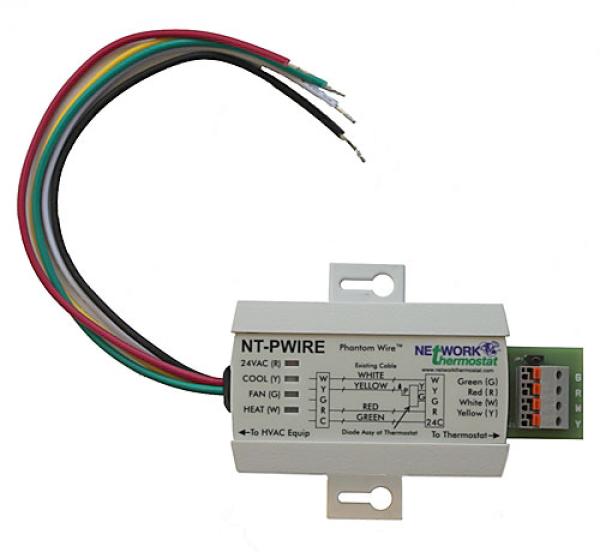Phantom Wire Kit
- Creates a Phantom 24VAC Common Wire
- Use When There is One Too Few Conductors in Existing Thermostat Cable
- Integrated LEDs showing Power and Operation of Heat, Cool, and Fan
- Jumper Allowing Removal of LED functions if Not Desired
- Color-Coded Cabling for 5-wire HVAC connection at Equipment
- Screwless Terminals for Existing Thermostat Cable
- Wiring Diagram included on Case Cover for Easy Installation and Troubleshooting
Specs
DEVICE ASSEMBLY at HVAC EQUIPMENT
Rated Voltage: 20V to 30VAC, 24VAC nominal
Rated Output Current: 5A / 250VAC, 5A / 28VDC
Thermostat Terminations: All Screwless, G – Green, R – Red, W – White, Y – Yellow
Equipment Wires: 9” with Stripped & Tinned Ends, R – Red (24VAC+), C – Black (24VAC Common), W – White (Heat), Y – Yellow (Cool), G – Green (Fan)
Jumpers: JP1 – Remove Jumper to Disable LEDs
DIODE ASSEMBLY at THERMOSTAT
Diode Assembly Terminations: Y – Yellow (Cool), G – Green (Fan), B – Blue (Connect to Thermostat YELLOW wire)
Thermostat Terminations: R – Red (24VAC+), C – 24VAC Common (Green), W – Heat (White),Y - Connect to Diode Assembly BLUE wire
Description
The NT-PWIRE Phantom Wire device allows the installer to connect any NetX thermostat when a common wire is not available in the existing thermostat cable. This handy device creates a phantom wire. In many existing installations, older thermostat cables don't have a common (24VAC common) wire because they were not needed for the mechanical thermostats originally installed.
Years ago, it was typical for the cable to only have four (4) conductors. The NT-PWIRE creates the common wire so the HVAC unit can be used along with any NetX thermostat or just about any other thermostat requiring a 24VAC common. Additionally, the NT-PWIRE includes screwless terminals, color-coded wiring for the HVAC unit connection, and LEDs on the unit to show power, heat, cool, and fan calls are being created from the thermostat, practically eliminating troubleshooting.




